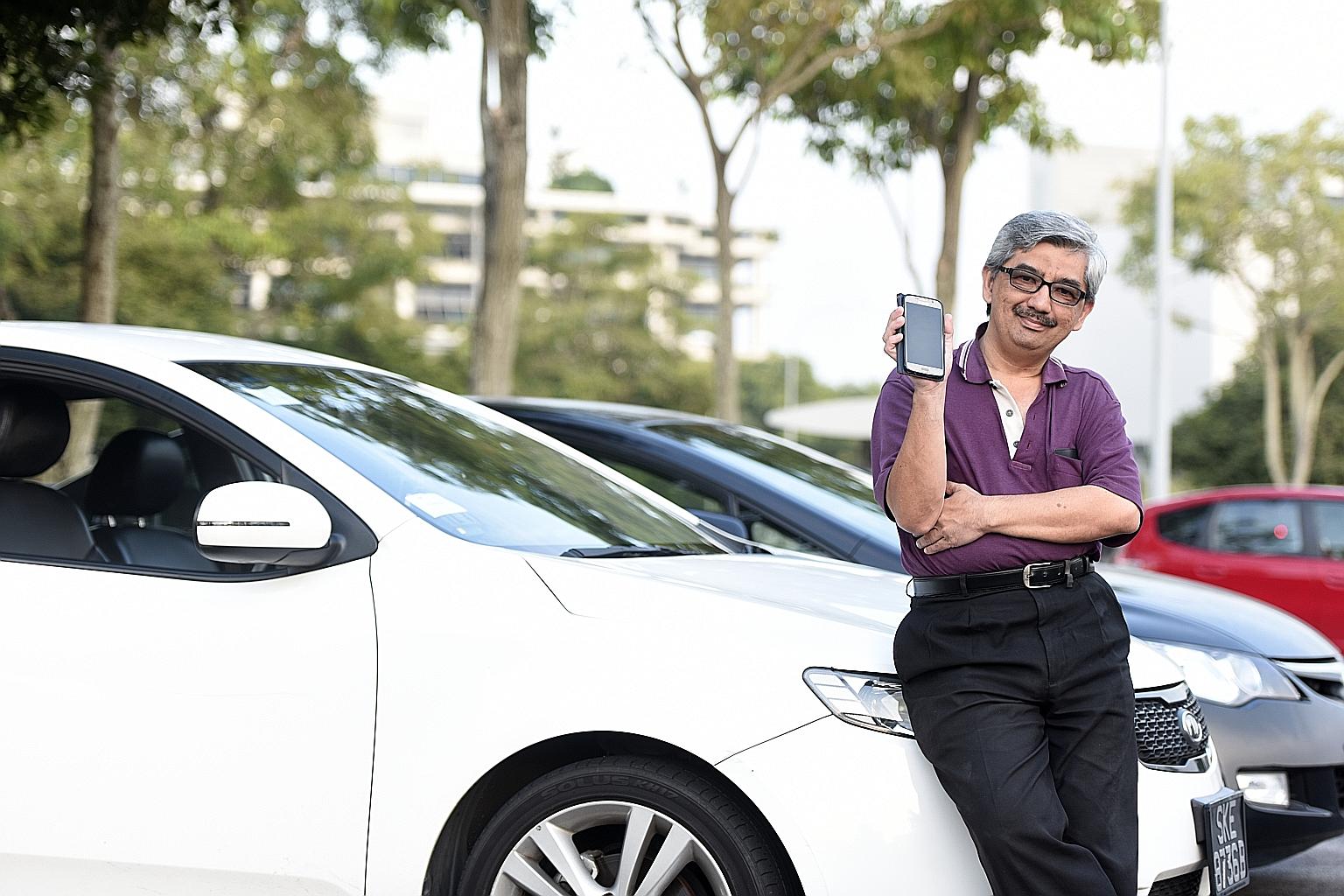Carpooling catches on among commuters
Cost saving and availability of apps to link up with drivers rev up demand for shared service
Sign up now: Get ST's newsletters delivered to your inbox

Mr Mohamed Sulaiman Osman has provided lifts to more than 120 people who chip in with some money to defray the cost of the trips. But for the principal engineer, the greater reward comes from meeting new people.
ST PHOTO: NIVASH JOYVIN
Adrian Lim
Follow topic:
Since March, the evening drive home from the office for Mr Mohamed Sulaiman Osman has become less lonely.
After signing up with a carpool matching service, the 53-year-old principal engineer now has the company of passengers. They are often people who work nearby and hitch a ride with him to get to Jurong West, where he lives.
His passengers pay him a few dollars to defray the cost, such as for petrol. But for Mr Sulaiman, it is about meeting new people.
"We ask each other 'how was your day?' and talk about general topics, from the traffic to makan (food) places," said Mr Sulaiman, who has given lifts to more than 120 people.
The carpooling practice appears to be increasingly popular, going by the growth of services such as Ryde and GrabHitch, which help link up drivers and passengers.
Ryde's fares start from $4 for a 3km ride, and vary based on the distance travelled. GrabHitch's fares are capped at $16.
Uber and Grab have also introduced options to allow commuters to share their private-hire car rides with strangers heading in the same direction, in return for a discount for the passengers.
Uber launched UberPool in July and Grab rolled out GrabShare earlier this month.
Uber's Singapore general manager Warren Tseng said: "Initially, there was certainly a bit of scepticism from the general public - whether Singaporeans would really be open to sharing their rides with others."
But UberPool became a hit.
About one in three Uber rides in Singapore is now carpooled while the global average is lower, about one in five.
So why has carpooling succeeded now when earlier attempts, such as the 1997 Share-A-Cab scheme, flopped?
Mr Terence Zou, Ryde's founder and chief executive, attributes this to the rise of the sharing economy, and a growing acceptance among Singaporeans of cutting costs on car ownership and travel.
He said Ryde's membership has increased fivefold in the last year, but declined to reveal numbers.
Mr Lim Kell Jay, head of Grab Singapore, said the number of GrabHitch users saw a "healthy month-on-month growth between 11/2 and three times" in the last six months though he also did not reveal figures.
Mr Moh Hon Meng, who started ShareTransport.sg in 2012, said new laws, which took effect in March last year, have created greater clarity on carpooling.
Among the rules, drivers can offer up to two rides a day, and can also accept monetary compensation, though it should not be for profit.
Mr Moh said websites and apps have also made it easy for drivers and passengers to find each other.
"Passengers can now view the driver's profile, see what car he has and the time he drives out, with just a tap of the app," he added.
ShareTransport.sg, which has more than 330 drivers and 7,000 passengers, is one of several carpooling websites here. Others include Carpool King and carpool.sg.
"Trust is a critical factor. We have a comprehensive system of ratings and reviews so members know who they are getting into a car with," said Mr Zou.
Mr Lim said carpooling "enables the current pool of registered vehicles in Singapore to serve more people, without introducing more vehicles on the road".
But not all commuters are sold on sharing a ride all the time.
Ms Jen Pelaez, 28, a software developer, said: "Because the journey can be 10 to 30 minutes longer, I won't use UberPool when I go to the office or when I'm in a rush.
"But during the weekends, yes, because I can save on the fares."
Mr Tseng, however, said Uber matches passengers so they should experience no more than 10 to 15 minutes of additional time for their trips. But passengers save quite a bit.
Uber has said carpooled rides are up to 25 per cent cheaper while GrabCar said they are up to 30 per cent less.
National University of Singapore sociologist Tan Ern Ser said Share-A-Cab likely did not pan out because it required commuters to be "pro-active". Under the scheme, information panels were put up at selected taxi stands, where commuters could indicate their destination and seek out others heading the same way.
"Rising cost of living also makes people more cost-conscious and therefore more (are) prepared to put up with a stranger sharing the same cab."
But carpooling is not always a smooth ride.
Mr Sulaiman recounts one occasion when he could not locate a passenger.
"She said she would be standing by the side of the road but I could not find her. I asked her to walk to a nearby carpark and she was not very happy. But it's a one-off incident," said Mr Sulaiman who uses the Ryde app.

